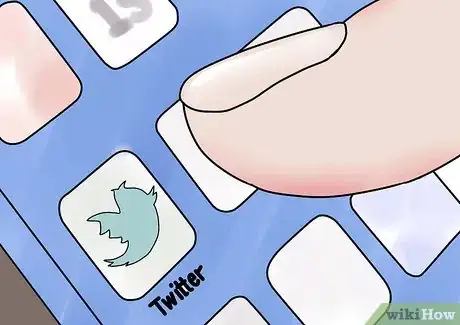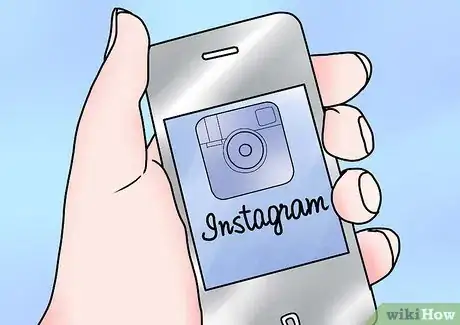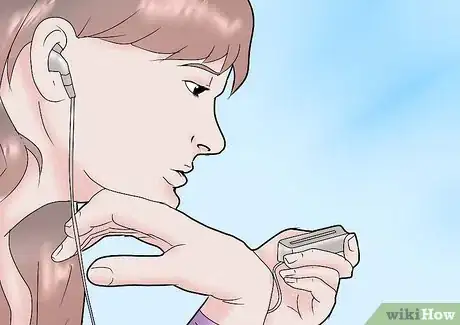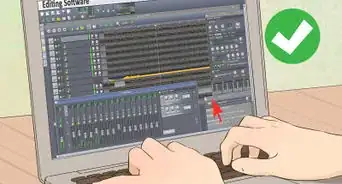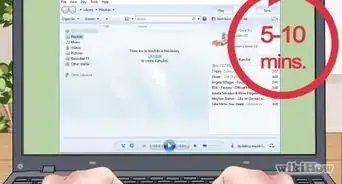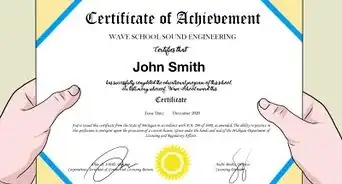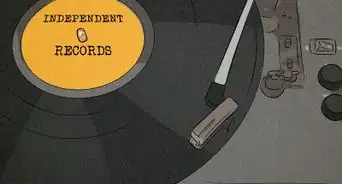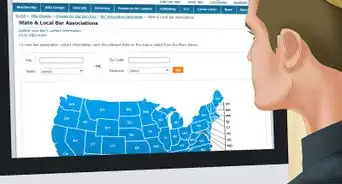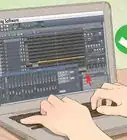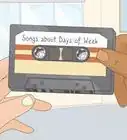This article was co-authored by Timothy Linetsky. Timothy Linetsky is a DJ, producer, and music educator that has been making music for over 15 years. He is a certified Ableton trainer and creates educational YouTube videos focused on producing electronic music. He has over 90,000 YouTube subscribers.
This article has been viewed 248,396 times.
Getting your music out there can be tricky when there are so many other talented artists competing for audience attention. However, if you promote yourself online and learn to make connections in person, you'll be one step closer to being a successful and well-known musician.
Steps
Get Ready to Promote Your Music
-
1Make sure you're ready to share your music with the world. Depending on your goals, if you promote a bad album or track, it may be hard to bounce back. Get feedback from respected people in the industry, and try to build relationships there if your goal is commercialization.
- Check out a music feedback service, which can help you share your music with other listeners and get feedback just a few days later. This is a great resource if you don't have as many connections in the professional world, or if you care more about getting in touch with potential fans than producers.
- Singrush.com is a platform where artists, bands, and producers can host their music for free and compete with one another, with the top liked song in each genre being showcased weekly.
-
2Consider your target audience. Whatever kind of music you're making, your audience is somewhere out there. If you're into Techno music, learn to tell the difference between Deep House, Tech House, and Electro. Understand what type of music you're really creating and who that type of music appeals to most of all.
- This will help you reach out to fans, book the right venues, and sell your music the right way.
Advertisement -
3Create your brand. Most listeners will also want to connect with the artist as well as the music. It's important to be yourself, but also to find a way to connect with listeners. Ideally, your potential audience will be as excited about you as they are your music.
Promote Your Music Online
-
1Promote your music through press releases. Press releases can help and be used by musicians as well. With the help of a press release firm, you can get a well-written article published on hundreds of news sites about you and your music. If you have a bit of a budget and some money to spend, it's definitely an advertising method to take into consideration.
-
2Promote your music on Twitter. Twitter is another excellent venue for getting in touch with your fans, promoting your content, and getting more people excited about your music. To promote your music on Twitter, you should actively update your timeline with new information about events, promotions, and album releases. Here are some other things to try as you promote your music on Twitter:[1]
- Live-tweet events. If you have a unique perspective on something, from your own concert to the Grammys, use the live-tweet to keep your fans engaged.
- Provide links to your videos or music.
- Master hashtags to get more people interested in your music.
- Take engaging photos that catch your followers' eyes and make them want more.
- Take the time to reply to your fans. Reply to them publicly and let everyone know how much you care about your fans and make them feel special for reaching out to you by sending them DMs with more content.
-
3Promote your music on Facebook. The best way to promote your music on Facebook is to create a Facebook Fan Page. This will allow you to connect with your fans and to separate your personal life from your professional life. Use your Facebook page to give fans basic information about your music, to provide exclusive content, and to give information about upcoming releases, concerts, and anything else your fans would like to know about your music.[2]
- Connect with your fans. Ask your fans for feedback, and take the time to respond to your fans' comments. This will make them feel more connected to you and your music.
- Reach out to other artists on Facebook. If you know a more popular artist or an artist whose music has a similar but larger fanbase, ask if he can promote your music on his page; this will drive up your likes.
- Create events. Use Facebook to create events that invite your fans to your latest concerts. Even if the venue has already created an event, this will help get the word out to more people.
-
4Promote your music on Instagram. You can use Instagram to reach out to even more fans. You should sync your Instagram and Facebook profiles to reach out to more people at once, and use popular hashtags to increase your visibility. Work on posting images from your band rehearsal, or even the occasional photo of you or your band members goofing off to show that you're human.[3]
- Take the time to engage with your fans. If they post a photo of your concert, you should like the photo.
- Post your content during weekday afternoons -- they tend to get more traffic that way.
- You can get more likes on Instagram by liking your fans' photos or commenting on more photos.
-
5Promote your music through a personal website. Though social media is an excellent platform for promoting your music, it can also help to create a website. This will help steer fans in the right direction in the most professional way possible. Your website should have information about your concerts, music, origin story, and anything else that can help get your fans more excited about your music.
- Use social media to promote your website, and include a link to your website in all of your social media profiles.
- You should pay for your own domain name and your own unique website instead of promoting your band on a site for many other bands if you want to stand out.
-
6Distribute your music online. Have your music readily available on Spotify, RadioAirplay, Deezer, Singrush, and iTunes. That way, you'll look like a real professional the next time a venue manager or fan asks where he can find your music.
- Use audio drops when you distribute and promote your music. This means telling your listeners where they can find your music at the beginning or at the end of every single, or at the beginning and end of every album.
- Set up profiles on SoundCloud, ReverbNation, and BandCamp. Having a presence on major music sites will help you build followers and fans. Use content-sharing sites like CoPromote to get your music shared by more people.
EXPERT TIPTimothy Linetsky is a DJ, producer, and music educator that has been making music for over 15 years. He is a certified Ableton trainer and creates educational YouTube videos focused on producing electronic music. He has over 90,000 YouTube subscribers.Music Producer & Instructor
 Timothy Linetsky
Timothy Linetsky
Music Producer & InstructorTry different strategies until you find what works for you. Timmy Linetsky, a musician who runs a popular YouTube channel, says: "I think a large part of this is just luck, but give yourself the opportunity to try as many different things as you can. Roll the dice as many times as you can and see what sticks."
Promote Your Music In-Person
-
1Build relationships in person. Any time you're out in the world, you have a chance to build a connection with someone in the music industry. You can start small, by following producers or artists online, and work your way to meeting them in person at concerts, small venues, or even social events (as long as you've been invited). Don't force it; just take the time to grow as an artist and to get to know as many people in the industry as you can.
- Always be friendly and polite. You never know who could end up helping you.
- Build relationships with fans as well. If a fan wants to interview you in-person or even online, say yes. This will help get your name out there, even if it's only to a few people.
-
2Create a killer press kit. The press kit should generate interest in you as an artist and a musician. It contains you or your band's biography, fact sheet, or brochure, promotional photos, any positive press your music has received, three song demos, and contact information.[4]
- Limit the amount of background information. Don't wear out your audience.
- Keep the fact sheet basic. Provide information about your hometown, the names of your band members and the instruments they play, album release information, touring dates, recording studio, producers, and contact information for your management.
- Your demo CD should be of high quality — remember that you have 30 seconds at most to grab the listener's attention.
- Include a gig sheet with information about future and past gigs.
- Include a few professional 8 x 10 photos.
-
3Find a manager. A manager is a person who will advise you and your band in every aspect of your career. You should find a manager who has worked with other artists successfully and who has many connections in the music industry and a solid reputation to boot. Use a music industry print directory to reach out to a manager, and ask any connections in the music industry if they have any recommendations.[5]
- Don't send along an unsolicited press kit. Instead, get in touch with a manager to see if you can send along your material. If it doesn't work out, you'll still make a connection in the process.
-
4Play as many shows as you can. Concerts are a great way to promote your music and to connect with your fans. Whether you're opening for Green Day or playing on a tiny stage at a local bar, use the concert to sell your brand and to sing your heart out. Take the time to connect with fans before and after the concert.
- Fans love free stuff. Use your concert as an opportunity to give out free t-shirts, merchandise with your band's name on it, singles, and anything else that can help get the word out there.
- If other bands are performing at the concert, talk to them to build more connections. Complement their work and if you hit it off, ask if they'd mind promoting your music.
Community Q&A
-
QuestionHow do you promote your music in an area you've never been to before?
 Community AnswerSocial media is an effective way to promote your music in areas you're unfamiliar with. For example, you can hold a meet-and-greet party in a popular local pub/club, and have special promotions, such as ticket discounts, contests, etc.
Community AnswerSocial media is an effective way to promote your music in areas you're unfamiliar with. For example, you can hold a meet-and-greet party in a popular local pub/club, and have special promotions, such as ticket discounts, contests, etc. -
QuestionWhat is that card called that people put their music on that has a code that can be scanned to download their music?
 Community AnswerThe picture that is scanned is called a QR Code. People typically put them on the back of business cards or even on their album artwork.
Community AnswerThe picture that is scanned is called a QR Code. People typically put them on the back of business cards or even on their album artwork. -
QuestionWhat if you can't sing, but you can write lyrics and the tune - but you can't write the background music like guitar? Doe that mean that you have to join a band? What if they don't want you as leader?
 Community AnswerWhat you're describing is a songwriter. A songwriter doesn't necessarily perform music or belong to a band. They typically write music for a variety of singers. It's okay if you can't write the instrumental parts, though it does help if you can. See How to Become a Song Writer.
Community AnswerWhat you're describing is a songwriter. A songwriter doesn't necessarily perform music or belong to a band. They typically write music for a variety of singers. It's okay if you can't write the instrumental parts, though it does help if you can. See How to Become a Song Writer.
References
- ↑ https://bandzoogle.com/blog/17-ways-to-promote-your-music-online
- ↑ http://mashable.com/2011/07/11/bands-facebook/
- ↑ https://bandzoogle.com/blog/17-ways-to-promote-your-music-online
- ↑ http://www.bandmix.com/articles/how-to-promote-your-music/
- ↑ http://www.bandmix.com/articles/how-to-promote-your-music/
About This Article
To promote your music online, create social media accounts to boost your audience. Use Twitter to live-tweet concerts and share photos and music videos. Similarly, on Facebook you can invite people to like your band’s page, reach out to other artists, and create event pages. Remember to use hashtags to increase the number of people exposed to your music. Finally, distribute your music to online sites like Spotify or RadioAirplay, and link to them through your web pages. To discover your brand potential, and unique ways to make your band stand out, read on!



